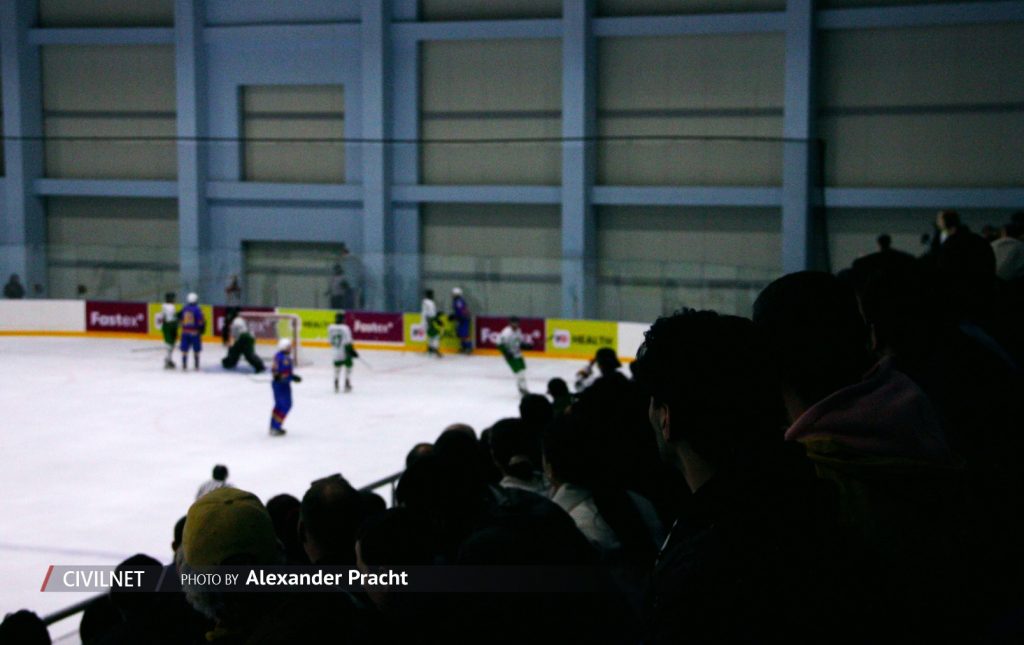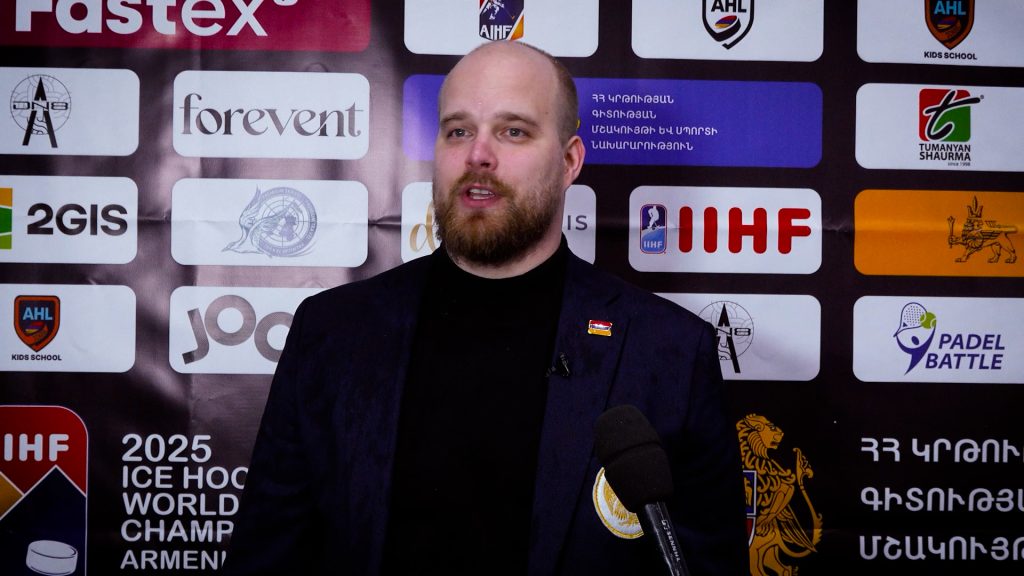By Alexander Pracht
The Division IV Ice Hockey World Championship concluded on Saturday in Yerevan, where six national teams competed for promotion to the higher-tier Division III. Although Armenia fell short of winning the tournament, the national team made a strong comeback to the ice after a 15-year hiatus, earning several impressive victories and sparking renewed local interest in the sport.
The World Championship is an annual tournament organized by divisions. The top division features the world’s strongest teams, such as the United States, Canada, and Sweden, while Division IV includes the lowest-ranked national teams from countries where ice hockey is still developing. Armenia falls into this category: hockey has never been a major sport in the South Caucasus, and fifteen years ago, the Armenian national team was suspended from international hockey over using ineligible players.
The revival of Armenian hockey is largely thanks to emigrants and players of Armenian descent from Russia, who began arriving in the country after 2022 and helped restart the domestic hockey championship. The current national team that competed in the World Championship was assembled exclusively from players in this league, which so far includes just four teams.
The final tournament roster was roughly split between ethnic Armenian players and naturalized players of Russian origin. Led by head coach Vadim Guskov and team captain Eduard Malakyan, Armenia was not considered a favorite going into the championship. After a 15-year absence from the international stage, the team’s prospects seemed uncertain at best.
Armenia opened the tournament with a crushing 24:3 victory over Malaysia. The next day, they faced the top contender for first place, Uzbekistan. Despite trailing during the game and facing intense pressure in their own zone, the Armenian players managed to push the game, which ended 2–2, into goalless overtime. In the shootout, they came out on top, scoring twice to Uzbekistan’s one. The hero of the match was Armenian goaltender Artyom Putulian, who made 57 saves and was later named the tournament’s best goaltender and was also recognized as Armenia’s most valuable player.
“It was a really tough game and a difficult opponent. I don’t even know how much effort we gave — I reckon a thousand percent for this win. Many thanks to the fans who supported us, this victory is for them,” Armenian forward Artyom Kuznetsov told CivilNet.

The victory over their main rival significantly boosted Armenia’s tournament prospects. However, in their next game, this time against Kuwait, the team suffered an unexpected defeat. A disastrous first period and a shaky start to the second left them trailing 0:4. Mustering their resolve, Armenia managed to claw their way back into the game and forced overtime once again, only to concede a surprising goal despite having the upper hand in play.
“For the guys, that loss felt like the end of the world — but that just shows what kind of men they are. They care. They didn’t come out there just to mess around,” Armenia’s head coach Vadim Guskov told CivilNet. “The team was devastated, crushed, and so were we, the coaching staff.”
The loss to Kuwait, a team that, like Armenia, had brought a strong group of Russian-born players, effectively ended Armenia’s hopes of winning the tournament. The leading teams didn’t slip up again: Armenia went on to shut out Iran 8–0 and rout Indonesia 14–1, but with Uzbekistan finishing one point ahead, despite their earlier defeat, Armenia had to settle for second place, just ahead of Kuwait in the standings.
The arena in Yerevan, which hosted all the matches, was well-received by fans — largely due to its convenient navigation and food and beer stands. Many admitted that after attending the team’s first game in the tournament, they decided to come to every match.
“I was here yesterday, and I came today, despite the loss [to Kuwait]. You have to support your home team at all times,” said Arman Padaryan, a fan, during the break in the game against Iran, speaking to CivilNet.
The tournament also caught the attention of foreign fans, in addition to the locals. “It’s really cool seeing Armenian hockey develop. You know, there’s a lot of potential and a lot of excitement from the fans here,” said Gabriel Sabbagyan, a representative of the Armenian diaspora in Canada, the birthplace of ice hockey.
Despite not winning the tournament, Armenia’s national team has a bright future ahead, according to head coach Guskov.

“There is a lot of room for growth in many aspects, the team is very young. First and foremost, we need to learn to play disciplined hockey, control our emotions, handle both victories and defeats, and train a lot, constantly improving in physical and technical aspects,” he told CivilNet.
“Organizing such a tournament is the first step in popularizing hockey in Armenia,” René Fasel, former president of the International Ice Hockey Federation, told a CivilNet correspondent during a press conference at the tournament. “Armenia is a very sporty country, so I believe it will succeed,” he added.
The growing popularity of hockey in the country is becoming more and more evident, says Vadim Guskov. “We had quite a few fans at the first game, even more at the second, and even more at the third. So the stands were always full when Armenia played. People are starting to recognize us on the streets now. Taxi drivers no longer ask, ‘Wait, Armenia has a hockey team?’ — now they ask, ‘Are you playing today or tomorrow?’”
The post Armenian hockey team runner-up at World Championship in Yerevan appeared first on CIVILNET.